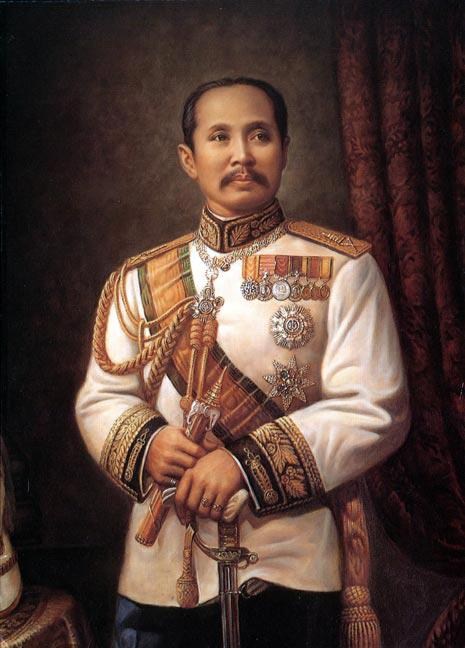 |
| Rama V - Thai King |
Rama V, commonly known as Chulalongkorn, was one of the greatest Thai monarchs, noted for his foreign policy and modernization. The fifth king of the Chakri dynasty was born to King Mongkut and Queen Debsirinda in 1853.
Mongkut was an enlightened ruler who employed Anna Leonowens to be an English governess for his children; the story is told in the book Anna and the King of Siam, later adapted to the musical The King and I. Chulalongkorn also studied in a Buddhist monastery for two years and succeeded to the throne on October 1, 1868.
His reign began under the regency of Prime Minister Chao Praya Srisuriyawongse, as he was too young to rule. He visited Penang, Singapore, Java, Burma, Calcutta, and India during this period and got firsthand knowledge of Western colonial administrations. He also visited Europe twice, in 1897 and 1907.
  |
Mongkut and Chulalongkorn kept up with the times. It was because of the endeavors of the father-and-son duo that Thailand preserved its independence and became a modern state. His 42 years of liberal rule saw reforms with far-reaching consequences for Thailand.
The administrative structure of Thailand was changed in 1882 with the introduction of a cabinet system with ministers responsible to the king. The archaic feudal administration was changed with the division of the kingdom into provinces and districts.
The king’s administrative reforms touched almost every aspect of the state. In 1884 state schools were established and were open to girls and boys. The newly established government printing press published the textbooks. State scholars were sent abroad and later modern universities were established in Thailand. The traditional lunar calendar was replaced by a Western one with Sunday as a holiday in 1899.
Chulalongkorn was instrumental in developing a modern army. The first railroad opened in 1896 from Bangkok to Ayudhya and, in 1905, the first foreign loan from Britain to meet expenses for its building was received. A benevolent monarch, he traveled throughout the kingdom to see the condition of his subjects. Thailand became a viable, stable, and modern state because of the reforms of Chulalongkorn.
Prudent Policies
Thailand survived without becoming a colony of either Britain or France, unlike its neighbors, thanks to prudent policies of the king, although Mongkut and Chulalongkorn both signed unequal treaties of friendship and commerce with the Western powers that allowed them extraterritoriality rights.
Aware of the limitations of his military, Chulalongkorn made land concessions to France and Britain that kept Thailand as a buffer state between the two. In 1893 Thailand gave up its claim on the territories of the left bank of the Mekong River, covering most of the area of modern Laos to France.
In 1904 the Anglo-French treaty designated the respective spheres of influence of Britain and France. In exchange for 25 kilometers of neutral zone along the Mekong’s west bank, Thailand gave Champassak and Sayaboury provinces to France in 1904 and 1907.
By the Anglo-Thai Convention of 1909 Thailand gave up its rights over the four southern states of the Malay Peninsula: Kedah, Perlis, Kelantan, and Trengganu, while Britain recognized Thai control over the Muslim-dominated Pattani Province. The convention thus fixed the present existing boundary between Malaysia and Thailand, which has become one of the factors for the rise of Islamic terrorism in Thailand.
When Chulalongkorn died on October 23, 1910, in Bangkok, he left a modern Thai state to his successor, Rama VI. To commemorate the reign of Chulalongkorn, October 23 is observed as a national holiday.